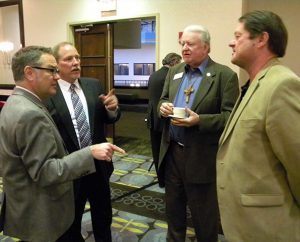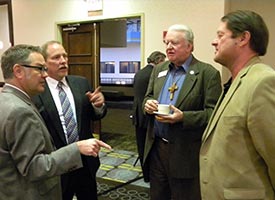By Joe Isenhower Jr.
ST. LOUIS — The Synod Board of Directors took care of business for its winter meeting here in one day — Feb. 14. The Board’s meetings usually span two days.
One efficiency put to use for the first time at this meeting was the Board’s adoption of a consent agenda — essentially accepting in one motion a number of reports and noncontroversial action items that for previous meetings were usually handled individually.

Among the day’s actions, the Board approved the five regions into which LCMS districts are grouped — retaining the same boundaries that were set three years ago.
The LCMS Council of Presidents also approved the same configuration of those regions during its Feb. 18-21 retreat and meeting in Phoenix. As called for in LCMS Bylaws, the regional configuration is set by both groups at least two years before each Synod convention — for elections of Synod vice-presidents and board members representing the regions.
The Board’s resolution notes that with essentially 20 percent of the Synod’s congregations in each region, there was no compelling need to change those boundaries.
“Allowing regional lines to remain the same from convention to convention avoids confusion for the election process,” according to a rationale statement with the resolution.
The Board also adopted a resolution of support for Lutheran Church Extension Fund (LCEF) to use its assets to sponsor a federally chartered credit union.
The action is divided into three sections titled “Findings regarding sponsorship by LCEF of [a] credit union,” “Approval of use of LCEF assets to sponsor a credit union” and “Credit union will be [a] separate legal entity.”
As noted in a Page 1 story in the January Reporter, the Board “expressed appreciation” at its Nov. 21-22 meeting for a presentation by LCEF President and CEO Richard “Rich” Robertson about LCEF’s “proposed sponsorship of a federally chartered credit union for LCMS congregations and their members, as well as other LCMS-related entities and people.” (For that story, click here.)
Also at its Feb. 14 meeting, the Board re-appointed Alan F. Doud of Bakersfield, Calif., to a three-year position on the board of directors of Lutheran Housing Support and appointed Jennifer L. Shields of Rock Springs, Wyo., to fill a vacancy on that board.
In other actions, the Board of Directors:
- approved bylaw amendments for Concordia International “GmbH” — the German acronym for a limited-liability corporation the board established in Germany to support LCMS workers in the Eurasia region.
- authorized an increase of $94,069 to the current year’s capital budget for completing work on KFUO’s transmission-tower project in St. Louis.
The project “was designed to chronologically follow the KFUO studios relocation to the [LCMS] International Center [in] July 2013,” according to the resolution, which also states that the “project’s purpose is to allow for total independence from the original KFUO building” on the property of Concordia Seminary, St. Louis.
- re-appointed Ron Schultz as the Synod’s chief administrative officer for the next three years.
- re-appointed for the next three years the Thompson Coburn, LLP law firm as the General Counsel for the Synod.
Mark Hofman, executive director of LCMS Mission Advancement, briefed the board on two matters: an inaugural annual report planned for the Synod and Mission Advancement’s “performance year-to-date [mid-fiscal year] versus goals.”
“The underlying strategy [for the annual report] is driven by the reality that our Synod must proactively solicit gifts to meet budget,” Hofman said, “and that we have to expend time and energy securing donations.” He added that it would seek to “build trust” in the Synod.
He also told the Board that on Feb. 6, the LCMS “joined the ranks of 2,444 other nonprofits that have achieved Guidestar Exchange Gold Participation status — the highest possible validation by this important trust-verification partner.”
“Under a plan for continuous improvement,” he continued, “feedback from stakeholders will shape and refine future annual reports so that they meet the needs and expectations of those most interested in the Synod’s mission, plans and management achievements.”
Concerning performance, Hofman said, “From a total direct-gifts perspective, Synod received charitable gifts in excess of the total goal flow rate through Dec. 31.”
He noted that donor giving has been “favorable.”
Synod President Rev. Dr. Matthew C. Harrison told the Board about his first district visitation of the triennium, with leaders of the SELC District.
“It was fantastic … a wonderful couple days together. They laid out the history of their district and we just talked,” he said.
Harrison added that from a list of “subjects of what the Synod is doing,” those leaders gave him their opinions on 30 of those subjects.
“They really appreciated the time together,” he said. “It was positive, all the way around. I think we’re on the right track with these visitations.”
First Vice-President Rev. Dr. Herbert C. Mueller agreed with Harrison’s comments on visits to districts, adding that he has had two so far in the triennium — in the Montana and Minnesota North Districts.
“On the church-relations front, things are going well,” Harrison told the Board, as he spoke of his recent visits to Africa and Madagascar.
Schultz laid out for the Board a number of planned efficiency efforts in the Synod units for which he is responsible.
And during his remarks, Chief Financial Officer Jerald C. Wulf — who the Board re-appointed to the position at its meeting in November — introduced Ross Stroh, the Synod’s new executive director of Accounting. In that position, Stroh succeeds Charles E. Rhodes, who retired last year.
